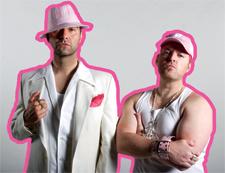Last year’s slew of alleged gaybashings are too-fresh memories for most of us, so a queer hip-hop musical that bills itself as a “funny” look at homophobia certainly feels like it’s toeing the line of good taste.
But actor-writer Nathan Cuckow, who co-created BASH’d: A Gay Rap Opera with Chris Craddock, insists the production isn’t just courting controversy: It’s fighting for equality, tongue firmly in cheek.
In BASH’d, Feminem (Cuckow) and T-Bag (Craddock) are MCs who rap and narrate the story of Jack and Dillon, two men who meet, fall in love and get married before a violent gaybashing irrevocably changes their lives and leaves one of them obsessed with revenge and retribution.
Cuckow and Craddock created their rap alter-egos almost 10 years ago, but BASH’d was written in 2004 as part social satire and part “fuck you” to former Alberta premier Ralph Klein.
The equal marriage debate had a major vocal opponent in Klein, who vowed to use the “notwithstanding” clause to exclude Alberta should federal law legalize gay marriage (he didn’t). Cuckow recalls his frustration and says the fear mongering perpetuated homophobia.
“There was a lot of militaristic language that was used at the time to the extent of ‘We’ll use every weapon in our arsenal to fight this’ and stuff like that,” he says. “Any time you have a government or a religion using that kind of language in opposition of a minority — it kind of created a culture of war, like a war on our rights, and straight people were being made to feel their rights were being taken away somehow or that gay marriage was going to cripple the economy. That attitude was creating a culture of fear, and, in a way, people are made to feel they have to fight back.”
Cuckow and Craddock’s use of rap music, which has also been accused of contributing to anti-gay attitudes, might seem like a strange choice, but the duo are avowed hip-hop fans and cite the genre’s origins in social justice and activism as positive ways of promoting equality. They point to artists like Mos Def and Missy Elliot.
“Initially, the idea of gay rap was just kind of fun and funny in a way because the medium in the mainstream is known as being so homophobic,” Cuckow admits. “It was empowering to take that and be overtly sexual and overtly gay and just have a lot of fun. Like the music can be without being homophobic and mysogynistic, like more socially-conscious hip hop can be. It’s just not the stuff that the record industry pushes on suburban teens.”
Choosing to root the music in hip hop has likely helped ensure that BASH’d continues to attract a diverse audience as interested in the music as it is in the message.
The musical’s buzz has been almost overwhelmingly positive, and Cuckow and Craddock have been successfully touring since winning the 2007 Best Musical Award at the New York Fringe Festival, which sparked an Off-Off-Broadway stint that earned the duo a 2008 Gay & Lesbian Alliance Against Defamation (GLAAD) award.
Cuckow himself is no stranger to anti-gay slurs or physical attacks and admits that keeping his sense of humour sharp is a coping mechanism.
His visit to New York City two years ago was a sad reminder of the ongoing relevance of a production like BASH’d.
“We were racing to go and see a Fringe show down in Greenwich Village and were moving quite quickly,” he recalls. “We were about a block away from Stonewall and this guy walked by us and called us ‘faggots.’ Chris sort of stopped for a second and was like, ‘I think that guy just called us ‘faggots.’
“We were a block away from Stonewall and that’s the last time I’ve been vocally called a faggot by somebody.”
BASH’d is both a “fun parody and a call to arms,” says Craddock.
“Now is the time in our history to be active,” he says. “I think the time for positive thinking is over and the time for anger is here, and we need to rise up on these issues and other issues because we face powerful opposition.”
— With files from FC Estrella

 Why you can trust Xtra
Why you can trust Xtra


